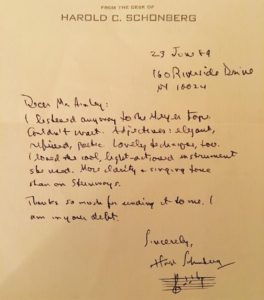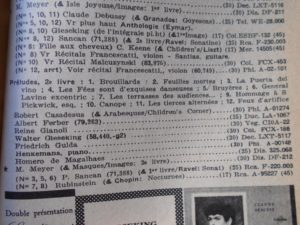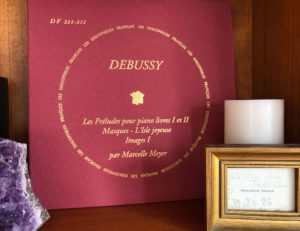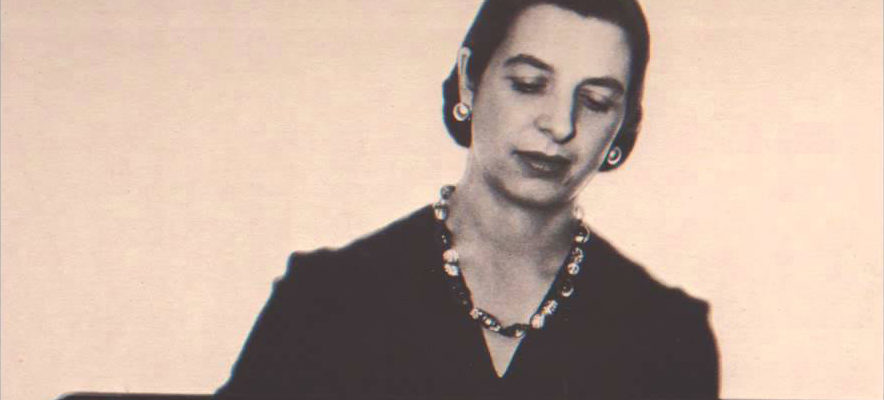Anyone who explores historical recordings is interested in ‘what might have been’ – opportunities for recordings that never transpired, missed chances that were not realized. Fortunately in some cases, new technology and the hard work of dedicated fans can lead to revealing what might have been, even if at a different time – a return to the Golden Era but in the present.

One of the artists I have been most fascinated by for the last three decades is Marcelle Meyer, a remarkable French pianist who somehow recorded 17 CDs’ worth of material from the 1920s to the 1950s yet who was virtually unknown to even the most ardent pianophiles: it was I who introduced her playing to Harold C Schonberg 30 years ago – he had never heard of her. Everything that this incredible pianist recorded seems to have been absolutely impeccable: indeed, a pupil of Jorge Bolet told me he considers the ‘discovery’ of this artist (for those who never knew of her) to be one of the most significant he has ever encountered, as he stated rhetorically, ‘Is there anything she did that was less than perfect? I have yet to hear it.’
Indeed it’s a mystery how a pianist of such incredible talent, capability, and intelligence could have been forgotten – and one who was in the right place at the right time to work with among the most legendary composers of her time, among them Debussy, Satie, Ravel, Milhaud, Poulenc, and Stravinsky. One possibility is that she recorded primarily for the rather exclusive French label Les Discophiles Français, which had limited circulation outside of Europe; although some of these were published in the US on the Haydn Society label, these pressings were inferior and still escaped the notice of the likes of Harold C Schonberg. The beautiful French editions included gatefold two-disc sets with textured stitched covers, the recordings themselves engineered by the legendary engineer André Charlin. These albums continue be highly prized by collectors in shops and online auction sites for both their top-level production and the marvellous playing of this fabled pianist.

In the late 1950s, Les Discophiles Français unexpectedly went bankrupt. Meyer’s daughter Anne-Marie di Vieto told me, when I interviewed her for two articles that I wrote, how dejected her mother was that the label manager Henri Screpel simply disappeared without a trace when he had been a close family friend, frequently having dinners with them at their home. Meyer had two more records ‘in the can’ which would remain unreleased on vinyl: the complete Debussy Preludes and several other solo works by the composer. The two discs had even been issued catalogue numbers, their release announced in the French record magazine Disques, and while some Discophiles Français recordings of higher catalogue numbers did come out, Meyer’s did not. These records would be of particular interest because Meyer was coached by Debussy himself specifically on how to play his Preludes in the last year of his life: the composer had met Meyer at the premiere performance of Satie’s Parade and then worked with her until his death.
Test pressings of these unpublished records were found in the collection of Anne-Marie’s sister Marie Bertin in the ’80s and the Preludes were issued as a stand-alone bonus CD in EMI France’s Références series, a release that was not easily available (it was part of a buy-3-CDs-and-get-this-one-free campaign). The performances would later be included in EMI France’s series of Meyer recordings released in the ’90s, and then again in 2007 when Meyer’s complete studio recordings were released in a commemorative box by EMI France (now out of print).
The availability of Meyer’s discography on CD (and the proliferation of YouTube) has certainly spread worldwide awareness and appreciation of her astounding artistry (I’ve certainly not stopped writing and speaking about her for the last three decades, and I never will). That said, audiophiles will be aware that the sound on CDs is simply nowhere near as warm and rich as what can be heard on LPs – particularly when compared with well-mastered and -pressed editions; unfortunately, larger labels often choose to make the sound conform to the framework of a modern recording rather than reproduce the full frequencies of the original recording. This is one of the reasons why Meyer’s original discs continue to fetch top dollar at eBay and other auction sites and stores (I’ve seen sets regularly sell for a high three figures): not only are these limited edition records prized for their rarity, but both the physical presentation and the sound quality are exceptional… to say nothing of her superb performances.

The French Record Company has gone to a tremendous effort to manifest a remarkable vision: the first vinyl release of what should have been Meyer’s final two records for the label, the aforementioned Debussy Preludes as well as other solo works by the composer. To do so, they have reproduced exactly the original vinyl LPs of the Discophiles Français series: the font and embossed text, stitched gatefold jacket, and record labels are all identical to the original 1950s releases. And the sound quality is simply superb: the original tapes, provided by Warner Classics, were cut directly to vinyl using the highest grade of vintage analogue equipment (including vacuum tubes). The result is a degree of warmth and presence that is completely different from the experience of listening in any other format (I truly felt that the piano was in my living room), and the finished product is an absolute replica of how the original LPs would have looked and sounded had they been produced in the 1950s as intended (though the new ones likely sound even better, with quieter surfaces).
Naturally, with the vastly reduced market for vinyls today and this edition not being mass-produced – the covers were hand-stitched (see the details of that process here) – this is by its nature an exclusive production: with only 200 numbered copies available for sale, this limited edition authorized by the pianist’s daughter is for the connoisseur and collector, a Rolls Royce-style audiophile and collector’s item. The cost, while beyond the mainstream mass-produced vinyl being made by the big companies of today, is in fact on par with the current price of the original 1950s vinyl pressings – yet those are both older (and therefore not in new condition) and less rare (between 500 and 1000 were printed at the time). This release was specifically produced for Meyer fans that already invest in the original pressings of her records, as well as for audiophile specialists who want to hear her playing in the highest fidelity possible (indeed, I can think of no better way to honour such equipment, with playing of this standard and a production to match).
An example of the sound quality of this exceptional mastering (which sounds even richer on the actual records):
Vinyl releases are enjoying a revival – the major labels are producing limited run series of both new and old releases (I was surprised by how many I saw when I was in Tokyo last year). There is additionally a new market emerging for rereleases of LPs from the so-called Golden Era of vinyls (the 1950s) – another audiophile outfit, The Electric Recording Company, has produced limited runs of old 1950s LPs, many in lower numbers and at a higher cost than this one (and they’ve sold out, too). What makes The French Record Company‘s current set stand out is that it is not a reissue but a world premiere vinyl release of a 1950s recording. With the glorious playing of Meyer, the sublime music of Debussy, liner notes written by French musicologist Frederic Gaussin, and the exquisite craftsmanship of the 1950s originals reproduced exactly, the set is an example of French artistry at its best… an exemplification of l’Art Total.
It is 101 years since Debussy died, 61 years since Meyer died, and about 31 years since I first heard her playing and became enamoured with this peerless musician. Anything that celebrates her artistry at the exalted level that it warrants is cause for celebration. This production closes a circle left open by the dissolution of the label for whom she so arduously produced the bulk of her recorded output. However limited and exclusive this edition may be, may Meyer’s boundless talent and supreme music-making long be available for music lovers to appreciate.

Comments: 3
Another treasure thanks to you, dear Mark! Thank you very much!
Beautiful playing. An interesting approach to pedal use in Debussy.
She was a unique artist, a true treasure…